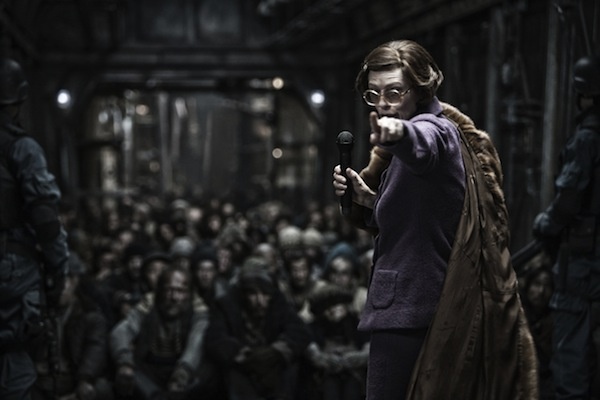
Snowpiercer is that rare sci fi thriller that effectively explores some serious questions without becoming ponderous or pretentious. Here’s the setup. In an attempt to fix global warming by chemically cooling the earth, mankind has moved the needle too far and has instead FROZEN the planet. The only survivors are a few thousand humans packed into a nuclear-powered, “self-sustainable” train that rattles around the earth on a circuitous track. The wealthy elite lives in comfort at the front of the train, while their cruel armed guards keep the wretched, unwashed poor in the back of the train. Naturally, the poor revolt and assault the front of the train.
So we have a conflict in a claustrophobic space, and the thrills come from how the poor think and fight their way up car-by-car. Because the train’s systems have been engineered to prevent this, it takes a lot of ingenuity. And it takes a lot of violence, too, and because the elite has almost run out of bullets repressing previous revolts, that violence is often of the medieval hacking-and-thumping sort.
The train in Snowpiercer, of course, is an allegory for a society with an extreme disparity of wealth – and it’s not far removed from similar societies in human history and even today. In Snowpiercer’s most pointed moments, the mouthpiece for the elite continually tells the poor that they are undeserving and lucky to get the morsels that they are allowed. But the more challenging question – and one that Snowpiercer leaves the audience to ponder – is what are the limits of order; naturally, we’re all against repression, but how about when the very survival of the species is up for grabs?
The production design of Snowpiercer is exceptional. The snowy planet is cool, but the best part of Snowpiercer is experiencing each part of the train, including the greenhouse car, the aquarium car, and (my favorite) the disco car. The imagination that went into creating a mobile space that must sustain itself with making its own food, treating its own water, educating its own kids, etc., is remarkable (and Oscar-worthy).
As the stonefaced leader of the uprising, Chris Evans is okay but doesn’t get to do much. That’s too bad, because I know he can act from his quirky role in The Iceman as hitman Mr. Freezy, who works out of his ice cream truck. Because I don’t watch superhero movies, I was unaware that Evans has recently starred as Captain America in The Avengers and as Johnny Storm in the Fantastic Four movies.
The best performance comes from Kang-ho Song as Snowpiercer’s most interesting character, a high-tech locksmith addicted, along with his 17-year-old daughter, to a drug of the future. Tilda Swinton is gloriously outrageous as a loathsome middle manager for the evil elite. After a spate of emo dramas, Octavia Spencer gets to swing her axe through a herd of bad guys. And Ed Harris, John Hurt and Alison Pill are all reliably good too.
I’m a big fan of Korean writer/director Joon-ho Bong, who made the brilliant 2003 detectives-hunting-serial killer movie Memories of a Murder (also with Kang-ho Song) and the 2009 drama Mother, which made my yearly Best Of list. Memories of a Murder is available on DVD from Netflix, and you can find Mother on DVD from Netflix and streaming on iTunes, Vudu and Xbox Video. He also co-wrote the upcoming on-the-seas thriller Sea Fog (Haemoo) which plays at the Toronto International Film Fest this fall.
You can also stream Snowpiercer on Amazon, iTunes, Vudu, YouTube, Google Play, Xbox Video and DirecTV.
